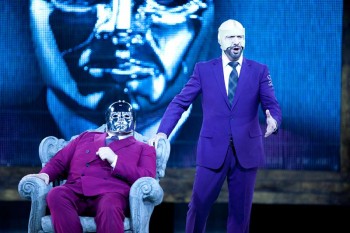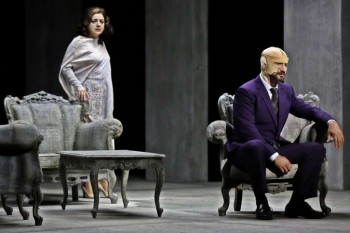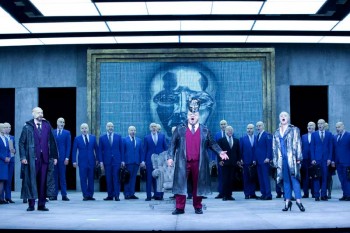A Masked Ball – Opera Australia
Giuseppe Verdi had a tough time when mounting the opera that eventually became Un ballo in maschera (A Masked Ball).

After basing the opera on the assassination of real-life King Gustav III of Sweden at a masquerade ball, the Italian censors forced Verdi to change the title, the setting and even the identity of the central character.
Showing the murder of a monarch onstage was a big no-no in Verdi’s day, so the action was moved to Boston and Gustav, King of Sweden became Riccardo, Earl of Warwick. In the following years, the original Swedish setting was returned and the central character became the King again.
Opera Australia has a grandiose new production of Verdi’s masterpiece brought to life by Spanish director Alex Ollé of theatre group La Fura del Baus, known around the world for their innovative, daring and spectacular performances.

This version takes place in a futuristic, Orwellian world ruled by a dictatorial King who watches over his citizens via surveillance cameras from his compound. The citizens are forced to wear identical masks and clothing and are identifiable only by numbers on their uniforms.
The set by Alfons Flores is equally beautiful and monstrous, with concrete pylons and walls flying in and out to create a range of spaces and moods.
The setting allows Ollé to flesh out the political points that Verdi and librettist Antonio Somma only really hinted at in the score.
[pull_left]a revelatory production that’s as relevant to its audience as all theatre should be[/pull_left]
There are some particularly poignant moments in this production that reflect different political climates all over the world. When Gustavo sings, “my people’s love watches over me and God protects me,” you can’t help but be reminded of one of Muammar Gaddafi’s more self-deluded speeches.
Because of all of this, it’s a revelatory production that’s as relevant to its audience as all theatre should be.
However, A Masked Ball is essentially about two things; the assassination of a King and a love triangle. In this production, the assassination and the political plotting have great depth. The love triangle? Not so much.
Those two elements should work in unison, but they clash uncomfortably.
It’s a little difficult to tell if it’s the fault of the singers for not giving their characters the red-hot passion required to make the opera work, or if it’s just the fact that operatic romanticism doesn’t sit that easily in Ollé’s re-imagining.
You definitely feel like you’re losing something in the transformation into a soulless Orwellian world, even though the music sounds every bit as beautiful and romantic as you’d like.
The Australian Opera and Ballet Orchestra are at their absolute best, playing with such passion and intensity under Andrea Molino’s baton that they almost make up for the lack of fire onstage.

Diego Torre as Gustav, Tamar Iveri as Amelia and Jose Carbo as Renato all sing their parts as well as anybody in the world would. Torre and Iveri both nail all the money notes the audience came to hear, and those moments are genuinely exciting.
Carbo, an Opera Australia regular, keeps going from strength to strength and is absolutely on top of his vocal game here. However, as hard as the three try, it’s a little difficult to feel anything for them in this production.
Mariana Pentcheva as Ulrica has an powerful and haunting lower register, although the top is a little unstable.
Australian starlet Taryn Fiebig turns in a fantastic performance in dazzling high heels as the King’s page (and now sassy P.A.), Oscar.
Fiebig seems more in step with the production than the others onstage and gives a more holistic performance. She’s not afraid to sacrifice a little vocal quality here and there to make the performance work and the character seem real.
This was a massive risk for Opera Australia and undoubtedly a bold and exciting venture that did many things that opera should do for today’s audiences.
It’s a smart production that will definitely make you think. Unfortunately it’s a matter of too much head, not enough heart.

Yes, you have put your finger on it in this insightful review about what worked and what didn’t. There are different kinds of directors at work – some direct concepts and scenery, some direct the drama and the actors etc. The modern tendency towards ‘relevance’ and ‘contemporaneity’ means that many directors direct concepts and scenery as Alex Olle here does. This meant that the performers were left floundering at sea, and nearly ALL the moments on stage were dramatically awkward or unconvincing and this militated against the drama. All the singers moved on stage without purpose and without the tension that Olle’s conception required. It was a pity that so much effort could be undermined by this total inattention to a key element – the actors and the drama. We ended up with an old-fashioned stand-and-sing performance framed by a potent concept.
Thanks Sonny. It’s always good to hear that people are engaging with our work on here!